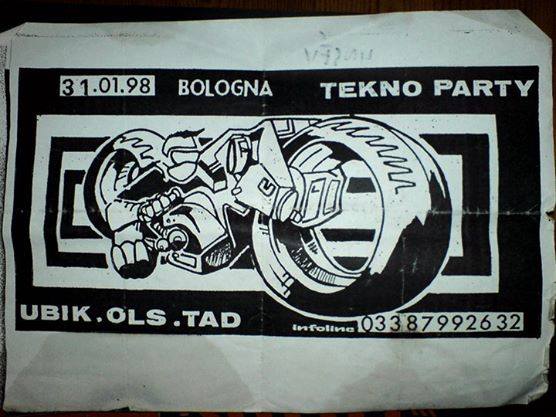Introduzione
Il movimento Tekno è emerso come una controcultura negli anni ’90, caratterizzato da un forte spirito di ribellione contro le norme sociali e commerciali. Al centro di questo movimento c’erano i “free party”, eventi organizzati autonomamente, spesso in luoghi non convenzionali, dove la musica tekno e l’auto-espressione erano gli elementi centrali. Questi eventi erano spesso liberi da costi d’ingresso e si basavano sulla partecipazione collettiva e sulla condivisione.
Contesto Storico
Negli anni ’80 e ’90 la musica elettronica stava guadagnando popolarità in tutto il mondo, trovando una casa nei club delle grandi città. Tuttavia, con il crescere della popolarità, la scena musicale elettronica cominciò a subire una forte commercializzazione. I club iniziarono a diventare luoghi dove l’accesso era determinato dalla capacità di pagare un biglietto d’ingresso costoso e l’esperienza musicale era spesso influenzata da logiche di profitto.
La Filosofia dei Free Party
I free party emersero proprio come una reazione contro questa tendenza. Gli organizzatori di questi eventi erano animati dal desiderio di riportare la musica al centro dell’esperienza, senza le limitazioni imposte dalle logiche commerciali. Questo significava creare eventi che fossero accessibili a tutti, indipendentemente dalla loro capacità economica e focalizzati sulla qualità e sull’autenticità della musica piuttosto che sul profitto.
- Accessibilità e Inclusività: I free party erano generalmente gratuiti o richiedevano una piccola donazione volontaria, permettendo a chiunque di partecipare. Questo approccio mirava a creare un ambiente inclusivo dove le barriere economiche non impedissero la partecipazione.
- Autonomia e Autogestione: Gli eventi erano spesso organizzati in modo autonomo, senza sponsorizzazioni o supporto da parte di grandi aziende. Questo assicurava che le decisioni riguardanti l’evento fossero prese collettivamente dalla comunità, mantenendo un controllo totale sul contenuto e l’atmosfera.
- Location Alternative: Per evitare le restrizioni e i costi associati ai club tradizionali, i free party si svolgevano in luoghi non convenzionali come boschi, magazzini, complessi industriali abbandonati e campi aperti. Questi spazi contribuivano a creare un’atmosfera di libertà e spontaneità.
- Centralità della Musica: Nei free party, la musica era l’elemento principale e centrale. Gli artisti e i DJ erano spesso membri della comunità e suonavano per il piacere di fare musica e della condivisione, piuttosto che per un compenso finanziario. Questo creava un’esperienza autentica e genuina, libera dalle influenze commerciali.
Contrasto con il Clubbing Commerciale
Nei club commerciali l’attenzione era spesso rivolta a massimizzare i profitti attraverso biglietti costosi, vendite di alcolici e merchandising in eventi che potevano includere elementi di lusso, esclusività e status sociale. La musica, sebbene importante, diventava solo una parte dell’esperienza complessiva, I free party al contrario, rifiutavano queste logiche concentrandosi sulla pura esperienza musicale e sulla comunità.
Evoluzione del Movimento Tekno
Nel corso degli anni il movimento tekno si è evoluto. Mentre i principi fondamentali dei free party rimangono intatti per molti, c’è stato un aumento delle attività commerciali legate al movimento. Queste includono la vendita di merchandise, la produzione di vinili e streaming digitale e l’organizzazione di eventi a pagamento. Molti artisti e organizzatori hanno iniziato a vedere il potenziale di guadagno senza necessariamente compromettere i valori fondamentali del movimento.
L’Aumento delle Attività Commerciali
L’introduzione delle attività commerciali nel movimento tekno ha suscitato dibattiti all’interno della stessa comunità. Da un lato c’è chi vede queste attività come una naturale evoluzione che permette agli artisti di sostenersi e di continuare a produrre musica. Dall’altro lato c’è chi è preoccupato che l’aumento delle attività commerciali possa compromettere lo spirito originale del movimento, che era basato sull’anti-commercialismo.
Importanza di Rispettare le Origini del Movimento
È cruciale che chi partecipa alle attività commerciali legate al movimento tekno sia consapevole delle sue origini. Questo significa rispettare i principi di inclusività, accessibilità e auto-espressione che erano alla base dei primi free party. Gli organizzatori e gli artisti devono essere trasparenti riguardo ai loro obiettivi e cercare di mantenere un equilibrio tra sostenibilità economica e fedeltà ai valori fondamentali del movimento.
Conclusione
Il movimento tekno e i free party rappresentano una forma di resistenza contro la commercializzazione della cultura musicale. Sebbene l’evoluzione verso un maggior numero di attività commerciali sia in parte inevitabile, è importante che la comunità rimanga vigile nel preservare lo spirito originale del movimento. Riconoscere l’importanza delle radici anti-commerciali può aiutare a garantire che il movimento tekno continui a essere una piattaforma per l’auto-espressione libera e inclusiva.
Text: Oby One
The Tekno Movement: Preserving the Roots in a Commercialized World
Introduction
The Tekno movement emerged as a countercultural subculture in the 1990s, characterized by a strong spirit of rebellion against social and commercial norms. At the heart of this movement are the “free parties,” autonomously organized events, often held in unconventional locations, where tekno music and self-expression were central elements. These events were often free of charge and relied on collective participation and sharing.
Historical Context
In the 1980s and 1990s, electronic music was gaining popularity worldwide, finding a home in big city clubs. However, as its popularity grew, the electronic music scene began to undergo heavy commercialization. Clubs started to become places where access was determined by the ability to pay an expensive entrance fee, and the musical experience was often influenced by profit motives.
The Philosophy of Free Parties
Free parties emerged as a reaction against this trend. The organizers of these events were driven by the desire to bring music back to the center of the experience, without the distractions and limitations imposed by commercial logic. This meant creating events that were accessible to everyone, regardless of their financial ability, and focused on the quality and authenticity of the music rather than profit.
Accessibility and Inclusivity
Free parties were generally free or required a small voluntary donation, allowing anyone to participate. This approach aimed to create an inclusive environment where economic barriers did not prevent participation.
Autonomy and Self-Management
The events were often organized autonomously, without sponsorships or support from large companies. This ensured that decisions regarding the event were made collectively by the community, maintaining total control over the content and atmosphere.
Alternative Locations
To avoid the restrictions and costs associated with traditional clubs, free parties were held in unconventional places such as forests, abandoned warehouses, and open fields. These spaces helped create an atmosphere of freedom and spontaneity.
Centrality of Music
In free parties, music was the main and central element. The artists and DJs were often members of the community and played for the joy of music and sharing, rather than for financial compensation. This created an authentic and genuine experience, free from commercial influences.
Contrast with Commercial Clubbing
In commercial clubs, the focus was often on maximizing profits through expensive tickets, alcohol sales, and merchandise. Music, although important, became just a part of the overall experience, which could include elements of luxury, exclusivity, and social status. Free parties, on the other hand, rejected these logics, focusing on the pure musical experience and community.
Evolution of the Tekno Movement
Over the years, the tekno movement has evolved. While the fundamental principles of free parties remain intact for many, there has been an increase in commercial activities related to the movement. This includes the sale of merchandise, the production of vinyl and CDs, and the organization of paid events. Many artists and organizers have started to see the potential for earning without necessarily compromising the fundamental values of the movement.
Increase in Commercial Activities
The introduction of commercial activities in the tekno movement has sparked debates within the community. On the one hand, there are those who see these activities as a natural evolution that allows artists to support themselves and continue producing music. On the other hand, there is concern that the increase in commercial activities could compromise the original spirit of the movement, which was based on anti-commercialism and self-sufficiency.
Importance of Respecting the Origins of the Movement
It is crucial that those participating in commercial activities related to the tekno movement are aware of its origins. This means respecting the principles of inclusivity, accessibility, and self-expression that were the foundation of the first free parties. Organizers and artists must be transparent about their goals and strive to maintain a balance between economic sustainability and fidelity to the fundamental values of the movement.
Conclusion
The tekno movement and free parties represent a form of resistance against the commercialization of musical culture. Although the evolution towards more commercial activities is partly inevitable, it is important for the community to remain vigilant in preserving the original spirit of the movement. Recognizing the importance of anti-commercial roots can help ensure that the tekno movement continues to be a platform for free self-expression and inclusivity.




